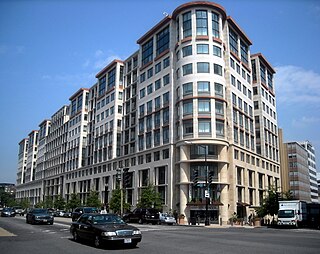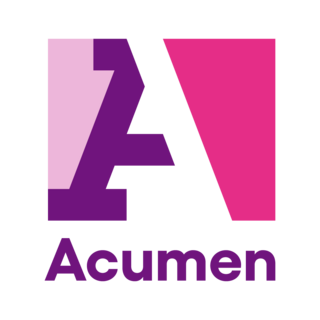
The economy of Laos is a lower-middle income developing economy. Being one of the socialist states, the Lao economic model resembles the Chinese socialist market and/or Vietnamese socialist-oriented market economies by combining high degrees of state ownership with openness to foreign direct investment and private ownership in a predominantly market-based framework.

The International Finance Corporation (IFC) is an international financial institution that offers investment, advisory, and asset-management services to encourage private-sector development in less developed countries. The IFC is a member of the World Bank Group and is headquartered in Washington, D.C. in the United States.

The Overseas Private Investment Corporation (OPIC) was the United States Government's Development finance institution until it merged with the Development Credit Authority (DCA) of the United States Agency for International Development (USAID) to form the U.S. International Development Finance Corporation (DFC). OPIC mobilized private capital to help solve critical development challenges and in doing so, advanced the foreign policy of the United States and national security objectives.

Venture capital (VC) is a form of private equity financing provided by firms or funds to startup, early-stage, and emerging companies, that have been deemed to have high growth potential or that have demonstrated high growth in terms of number of employees, annual revenue, scale of operations, etc. Venture capital firms or funds invest in these early-stage companies in exchange for equity, or an ownership stake. Venture capitalists take on the risk of financing start-ups in the hopes that some of the companies they support will become successful. Because startups face high uncertainty, VC investments have high rates of failure. Start-ups are usually based on an innovative technology or business model and they are often from high technology industries, such as information technology (IT), clean technology or biotechnology.

Mercy Corps is a global non-governmental, humanitarian aid organization operating in transitional contexts that have undergone, or have been undergoing, various forms of economic, environmental, social and political instabilities. The organization claims to have assisted more than 220 million people survive humanitarian conflicts, seek improvements in livelihoods, and deliver durable development to their communities.
A social enterprise is an organization that applies commercial strategies to maximize improvements in financial, social and environmental well-being. This may include maximizing social impact alongside profits for co-owners.
Private sector development (PSD) is a term in the international development industry to refer to a range of strategies for promoting economic growth and reducing poverty in developing countries by building private enterprises. This could be through working with firms directly, with membership organisations to represent them, or through a range of areas of policy and regulation to promote functioning, competitive markets.

Social entrepreneurship is an approach by individuals, groups, start-up companies or entrepreneurs, in which they develop, fund and implement solutions to social, cultural, or environmental issues. This concept may be applied to a wide range of organizations, which vary in size, aims, and beliefs. For-profit entrepreneurs typically measure performance using business metrics like profit, revenues and increases in stock prices. Social entrepreneurs, however, are either non-profits, or they blend for-profit goals with generating a positive "return to society". Therefore, they use different metrics. Social entrepreneurship typically attempts to further broad social, cultural and environmental goals often associated with the voluntary sector in areas such as poverty alleviation, health care and community development.
Marketisation or marketization is a restructuring process that enables state enterprises to operate as market-oriented firms by changing the legal environment in which they operate.

The U.S. African Development Foundation (USADF) is an independent U.S. government agency established by Congress in 1980 to invest directly in African grassroots enterprises and social entrepreneurs. USADF's investments aim to increase incomes, revenues, and jobs by promoting self-reliance and market-based solutions to poverty. USADF targets marginalized populations and underserved communities in the Sahel, Great Lakes, and the Horn of Africa. It partners with African governments, other U.S. government agencies, private corporations, and foundations to achieve transformative results.
ACDI/VOCA is an international development nonprofit organization based in Washington, D.C., United States, that fosters broad-based economic growth, increased living standards, and community development. Incorporated in 1965, ACDI/VOCA's mission is to promote economic opportunities for cooperatives, enterprises and communities through the innovative application of sound business practice. ACDI/VOCA has worked in 148 countries since 1963. Total revenues for ACDI/VOCA and its affiliates are approximately $154 million. ACDI/VOCA employs approximately 1,270 people in the US and overseas.

Acumen is a nonprofit impact investment fund based in the U.S. that focuses on investing in social enterprises that serve low-income individuals. Acumen was founded in April 2001 by Jacqueline Novogratz. It aims to demonstrate that small amounts of philanthropic capital, combined with business acumen, can result in thriving enterprises that serve vast numbers of the poor. Over the years, Acumen has invested $154.4 million in 167 companies and has had a successful track record in sourcing and executing investment opportunities in the clean energy, education, financial inclusion, health care and agriculture sectors.
The OPEC Fund for International Development is an intergovernmental development finance institution established in 1976 by the member states of the Organization of the Petroleum Exporting Countries (OPEC). The OPEC Fund was conceived at the Conference of the Sovereigns and Heads of State of OPEC Member Countries, which was held in Algiers, Algeria, in March 1975. A Solemn Declaration of the Conference "reaffirmed the natural solidarity which unites OPEC countries with other developing countries in their struggle to overcome underdevelopment", and called for measures to strengthen cooperation between these countries.
Impact investing refers to investments "made into companies, organizations, and funds with the intention to generate a measurable, beneficial social or environmental impact alongside a financial return". At its core, impact investing is about an alignment of an investor's beliefs and values with the allocation of capital to address social and/or environmental issues.
The Office of Social Innovation and Civic Participation was an office new to the Obama Administration, created within the White House, to catalyze new and innovative ways of encouraging government to do business differently. Its first director was the economist Sonal Shah. The final director was David Wilkinson.
A Challenge Fund is a competitive financing facility to disburse donor funding for international development projects, typically utilizing public sector or private foundation funds for market-based or incentive driven solutions. As Irwin and Porteous (2005) observed, "In practice, the objective of a challenge fund is to provide the smallest possible financial contribution to a socially worthwhile project consistent with making it less risky and more financially sustainable to the private promoter." Applicant qualifications differ widely among challenge funds, but typically focus on non-state actors.

The Nigerian Capital Development Fund (NCDF) is an organization dedicated to impact investing and promoting economic development in Nigeria. Established with the aim of fostering a resilient entrepreneurial ecosystem, NCDF provides essential support, capital, and resources to entrepreneurs, start-ups, and early-stage businesses. The organization's efforts are focused on facilitating job creation, product development, market expansion, and overall economic growth within the country.
Science and technology in Kazakhstan – government policies to develop science, technology and innovation in Kazakhstan.
Science and technology in Uganda refers to the growth within the technological industry in response to government efforts to develop a national innovation system, as well as any subsequent socioeconomic and cultural impacts of these endeavours.

Venture capital in Poland is a segment of the private equity market that finances early-stage high-risk companies based in Poland, with the potential for fast growth. As of March 2019, there is a total of 130 active VC firms in Poland, including local offices of international VC firms, and VC firms with mainly Polish management teams. Between 2009–2019, these entities have invested locally in over 750 companies, which gives an average of around 9 companies per portfolio. The Polish venture market accounts for 3% of the entire European ecosystem of VC investments, mainly in the digital space.









